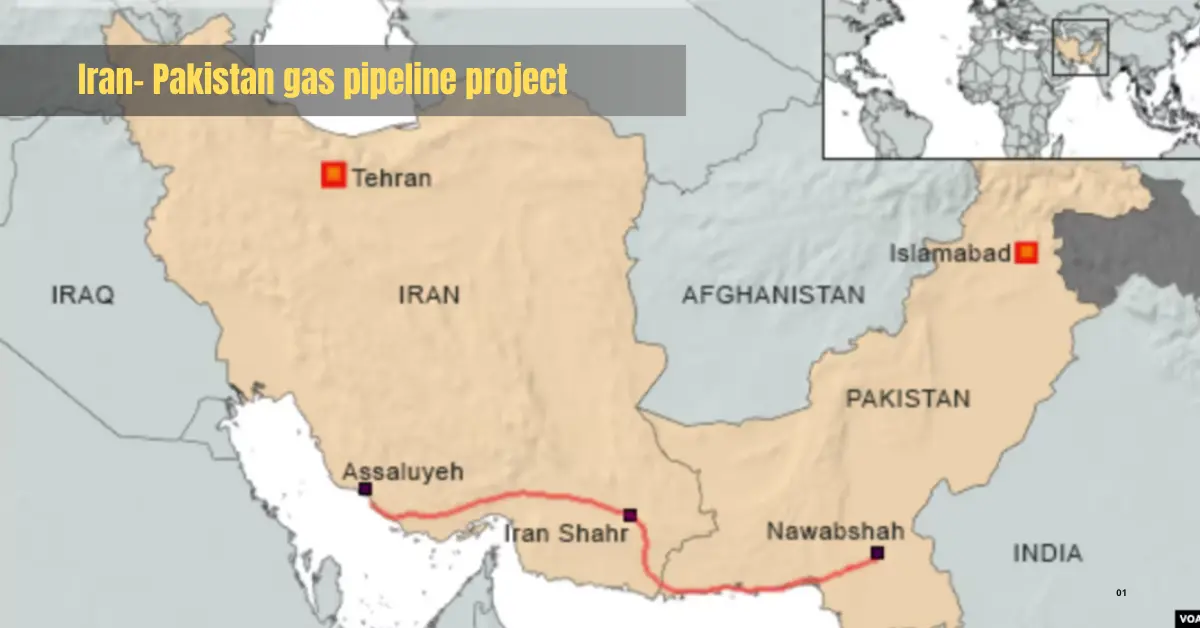Years of delays and international sanctions may be nearing a resolution as Pakistan eyes restarting construction on a key Iran- Pakistan gas pipeline project with Iran. The project, originally launched in 2013 to connect the Pakistani port city of Gwadar to the Iranian border, has been stalled due to US sanctions imposed on Iran.
Facing a potential $18 billion penalty for non-completion, Pakistan is now considering initiating work on the first phase of the pipeline – an 80-kilometer stretch from the border to Gwadar. This move aims to avoid the hefty fine while simultaneously seeking a waiver from US sanctions for the project.
Key points:
- Stalled project: The Iran-Pakistan gas pipeline project was initially planned for completion by 2014, but US sanctions on Iran brought construction to a halt.
- Looming penalty: Pakistan faces a potential $18 billion penalty if the project remains incomplete.
- Partial restart: Pakistan considers starting construction on the first phase of the pipeline to avoid the penalty.
- Sanctions hurdle: Pakistan seeks US sanctions waiver for the project to proceed further.
- Iranian progress: Iran has already completed its side of the pipeline and is ready to supply gas.
Also read: All About Winter Cup Gymnastics 2024, Where Can I Watch the Winter Cup 2024?
Pakistan’s dilemma:
On one hand, completing the Iran- Pakistan gas pipeline project offers significant benefits – access to affordable Iranian gas to meet its growing energy needs. On the other hand, defying US sanctions could invite economic repercussions. Seeking a waiver presents a potential solution, but its success remains uncertain.
Pakistan is actively engaged in talks with US officials, seeking an exemption for the pipeline project. However, the success of these negotiations remains unclear, adding further uncertainty to the project’s future.
Iran’s Investment and Potential Arbitration:
It’s important to note that Iran has already completed its section of the pipeline and invested a significant sum. Failure to move forward could trigger arbitration, with the exact penalty amount subject to the arbitrator’s decision.
Seeking a Waiver, Building in Phases:
One option being considered is completing the first phase of the pipeline – an 80-kilometer stretch from the border to Gwadar. This move, while seemingly insignificant, could serve two purposes: escaping the $18 billion penalty and demonstrating commitment to the project, potentially paving the way for a US sanctions waiver.
Energy Needs vs. Sanctions Dilemma:
Pakistan’s energy demand is growing rapidly, and the Iranian gas pipeline could provide much-needed relief. However, navigating the complex geopolitical landscape and securing a sanctions waiver present significant challenges.
The future of the project:
Whether Pakistan can navigate the complex geopolitical landscape and complete the Iran- Pakistan gas pipeline project remains to be seen. The negotiations with the US and the progress on construction work in the coming months will be crucial in determining the project’s fate.
FAQs
1. What is the Iran-Pakistan gas pipeline project?
A project to build a pipeline connecting Gwadar, Pakistan to the Iranian border, providing Pakistan with a natural gas source.
2. Why is the Iran-Pakistan gas pipeline project stalled?
US sanctions against Iran have discouraged investment and participation.
3. What is the penalty for Pakistan if it doesn’t complete the Iran-Pakistan gas pipeline project?
Up to $18 billion in fines, as per the agreement with Iran.
4. How is Pakistan trying to move forward with the Iran-Pakistan gas pipeline project ?
Considering building the first phase to avoid penalties and seeking a US sanctions waiver.
5. What are the potential outcomes of the Iran-Pakistan gas pipeline project ?
Project completion with or without US waiver, arbitration with unknown penalty, or complete abandonment.
6. What are the benefits of the Iran-Pakistan gas pipeline project for Pakistan?
Reliable and affordable natural gas source to meet growing energy demand.
7. What are the potential risks of the Iran-Pakistan gas pipeline project?
Further sanctions, strained relations with the US, and project delays or setbacks.
8. What are the key players involved in the Iran-Pakistan gas pipeline project?
Pakistan, Iran, US government, and energy companies.
Content contributor: Rehana Sengupta
*With inputs from oilprice.com









